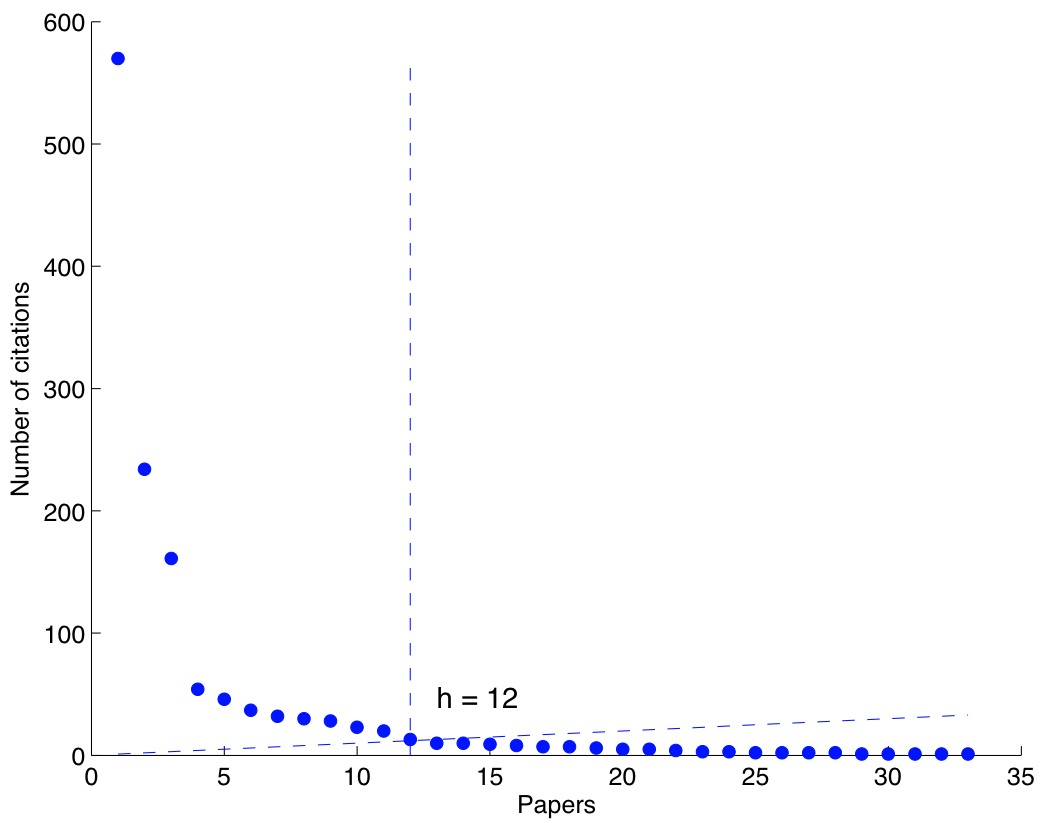Scientific impact, coarsely measured
July 30th, 2010 at 5:45 pm (Productivity, Research)
Recently at work, a new person we are hiring was described as having a high “h-index”. I had never heard of this term, so I looked it up later. The h-index is short for Hirsch index and was proposed by Jorge E. Hirsch as a method for quantitatively characterizing scientific impact through publications. It is defined as:
A scientist has index h if h of [his/her] Np papers have at least h citations each, and the other (Np – h) papers have at most h citations each.
Intrigued, I went off and calculated my own h-index, which (using citation data from Google scholar) is 12:

According to the wikipedia entry on the h-index, that’s a decent score for use in “tenure decisions”, while getting up to about 18 might rate a full professorship. Of course, this is a coarse metric with (like all other simple metrics) its drawbacks. It doesn’t factor in the number of other authors on the paper, or whether the citations are self-citations, or how the paper is cited (in a substantive manner vs. a member of a long list of work cited in the introduction). But who doesn’t enjoy a moment of quantitative navel-gazing? Calculate away!
Terran said,
August 30, 2010 at 12:47 pm
Yeah, I had encountered the h-index previously. Every once in a while I look at it myself, as a form of academic self-evaluation (or, perhaps, self-flagellation). According to Ethan Miller’s calculator (http://users.soe.ucsc.edu/~elm/hindex.shtml), I get 12 as well, though I can see that it’s missing at least one of my papers that got some attention in the RNAi world and racked up 40 or 50 citations that Google Scholar doesn’t seem to know about. So probably I’m at about 13 or maybe 14.
The depressing thing is that the highly cited articles are mostly stuff I did during grad school. *sigh*
Oh well — it’s a good statistic for CVs, anyway.
Kiri said,
November 11, 2010 at 5:50 pm
Here is a list of CS researchers with an h-index above 40.
Michael Littman said,
December 8, 2010 at 6:34 pm
(I’m on that list!) These days, when I write recommendation letters for people for jobs or promotions, I go through their citations on Google scholar and work out the H-index. As a result, I have a set of numbers that have been kind of useful for comparison and also tend to align well with my internal sense of people’s publication impact. By no means do I think H-index is the only meaningful measure of a scientist’s worth! But, it’s a nice thing to be able to comment on after I’ve given my opinion on several specific papers.
What I Learned Today » Blog Archive » Predicting h-index said,
September 22, 2012 at 9:00 pm
[…] goal was to predict a scientist’s future h-index given his or her current bibliographic data. I wrote about discovering the h-index two years ago. Nowadays, Google scholar will calculate this value for you. It’s a measure of […]